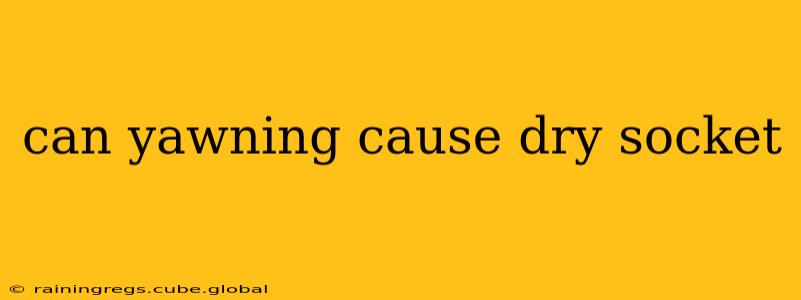Can Yawning Cause Dry Socket? Understanding the Risks and Myths
Dry socket, also known as alveolar osteitis, is a painful complication that can occur after a tooth extraction. While it's a relatively common complication, many myths surround its causes. One frequently asked question is whether yawning can cause dry socket. Let's explore this and other related concerns.
What is Dry Socket?
Before we address the yawning question, it's crucial to understand what dry socket is. It occurs when the blood clot that normally forms in the tooth socket after extraction becomes dislodged or dissolves prematurely. This exposes the underlying bone and nerve endings, leading to significant pain, bad breath, and sometimes a noticeable empty space in the socket.
Can Yawning Cause Dry Socket?
The short answer is: It's unlikely that yawning directly causes dry socket. While forceful yawning might put some slight pressure on the extraction site, it's not considered a primary cause. The formation and stability of the blood clot are primarily determined by factors occurring immediately after the extraction, such as:
- Surgical technique: The surgeon's skill in ensuring proper wound closure is paramount.
- Infection: Bacteria can interfere with clot formation.
- Patient habits: Smoking, using a straw, and excessive rinsing can disrupt the clot.
H2: What increases the risk of dry socket?
Several factors significantly increase your risk of developing dry socket, and these are far more relevant than simply yawning:
- Smoking: Nicotine constricts blood vessels, hindering blood clot formation. This is a major risk factor.
- Poor oral hygiene: Bacteria in the mouth can interfere with healing and increase infection risk.
- History of dry socket: If you've experienced dry socket before, you're at a higher risk of experiencing it again.
- Birth control pills: Some studies suggest a correlation between birth control pill use and increased dry socket risk.
- Difficult extractions: Complex extractions that involve significant trauma to the bone and surrounding tissues increase the risk.
H2: Does vigorous mouth rinsing cause dry socket?
Yes, vigorously rinsing your mouth or spitting forcefully after a tooth extraction can dislodge the blood clot, increasing your risk of dry socket. Gentle rinsing is usually recommended, if at all, and only with a prescribed mouthwash.
H2: Are there other activities that could potentially dislodge a blood clot?
While yawning is not a major culprit, activities that exert significant pressure or suction on the extraction site could potentially contribute. These include:
- Using a straw: The suction created can dislodge the clot.
- Kissing: Similar to using a straw, this can also create suction.
- Heavy coughing or sneezing: These actions could potentially put pressure on the extraction site.
H2: What should I do if I suspect I have a dry socket?
If you experience severe pain, bad breath, or a visible empty socket after a tooth extraction, contact your dentist or oral surgeon immediately. Early intervention is key to managing the pain and promoting healing.
Conclusion:
While forceful yawning might theoretically contribute to dislodging a fragile blood clot, it's not a major risk factor for dry socket. Focus instead on following your dentist's post-operative instructions diligently. This includes avoiding smoking, using straws, and excessive rinsing. Maintaining good oral hygiene is also essential for optimal healing and reducing the risk of complications like dry socket. If you have concerns, always consult your dentist or oral surgeon. They can provide personalized advice and address any specific questions you might have.
